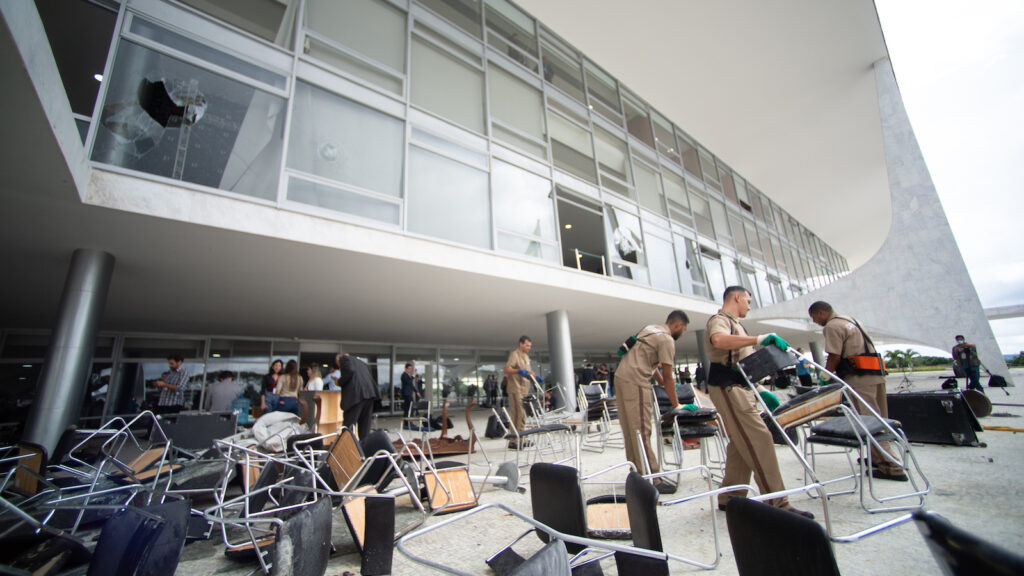Likely Political Trends In 2022

View of the horizon in Beijing, which suffered a number of reputational hits this past year concerning human rights abuses.
Photo: Martin Fu, Unsplash
Last year was a whirlwind of the Good, the Bad, and the Scary. Altamar hosts Peter Schechter and Muni Jensen are joined by Ryan Heath, author and host of Global Insider, POLITICO’s global newsletter and podcast. Heath previously authored POLITICO’s U.N. Playbook, Brussels Playbook and Davos Playbook. In his conversation with Schechter and Jensen, Heath looks back at last year’s takeaways and ambitiously forecasts some of 2022’s trends.
Positive Takeaways?
“What are some positive takeaways of 2021 and some promising trends for 2022?” asks Schechter. “I think the argument over net zero emissions has been won, but that does not mean we are guaranteed to get net zero emissions, or get them when we need them to keep the climate and the planet safe. But I think the intellectual argument is now over.
“We’re [also] starting to see some real outcomes as a result of #MeToo movements litigation court cases … just look at the gymnastics case settlement in the U.S. You [can also] look at the way the Chinese Communist Party is under pressure because of Peng Shuai’s allegations. You have the U.S. engaged in some really future-oriented investment debates … there’s [also] a lot of people who live to work rather than work to live. And the pandemic has been a moment for people to rethink how they want to do that stuff,” answers Heath.
Accountability for China Has Increased
Accountability — both personal and geopolitical — grew in importance in 2021. Nowhere is that truer than with China, notwithstanding its growing military power. Beijing suffered a number of reputational hits this past year. With newly instituted business restrictions and continued human rights abuses against Uyghurs, conversations about the “risk of China” seem to grow.
“I think the government in Beijing has been responsible for a lot of abuses over a lot of years. And it’s probably more the case that we are just thinking about them more and processing more of them, or when a billionaire is subject to the abuses like Jack Ma and others have been, then maybe it’s easier to grapple with than a faceless human rights advocate or a person living in rural China,” replies Heath.
But despite these reputational issues, China remains the most important strategic adversary to American supremacy on a global scale. Many smaller countries increasingly look to China for foreign investment and assistance. China is not going anywhere anytime soon.
Threats and Concerns in 2022
“Taiwan, Iran and Ukraine have analysts worrying about wars that include the planet’s great powers. What are the odds of these threats turning into a reality? How much of these tensions are related to a weakened United States?” asks Altamar’s Muni Jensen.
“We’ve been lucky for a very long time. We haven’t had major miscalculations with nuclear weapons. We haven’t had Western powers throwing themselves into wars by accident … we have to expect that our luck is not going to continue forever. So, I think there is a real risk on any of those,” says Heath.
People are going to start receiving that bill over the next 12 months, and it’s going to cause fights, either because people are ideologically opposed to those efforts or because they’re happy for them to happen if they don’t have to pay a price.
“It’s not that the U.S. is suddenly weak or just because it wasn’t really engaged with the world for those few years under (former President) Trump. I think it’s more that the U.S. is unquestionably declining in relative terms, so that’s just scrambling all of the power dynamics of the world,” continues Heath.
Democracy Saw a Backslide in 2021. Will This Trend Continue?
Latin America, for example, has seen a large-scale weakening of moderate political forces, and elections in Colombia and Brazil promise to be very polarized. What does the state of democracy look like now, and is there hope for the future?
“I would absolutely say that it’s been a fairly dark picture for a while now. But I think there are glimmers of hope. My starting point is always that democracy is about more than elections and electoral politics. And I think we’re starting to see more discussion around that now. In my mind, democracy is about any system that helps you give control over your life, and it’s always going to be imperfect and you always have to work for it, and you can’t take it for granted, but from whether it’s your building or your neighborhood or your city or your state or your country or whole global institutions, democracy can exist in any of those things if we are willing to actively work for it,” states Heath.
U.S. President Joe Biden put democracy at the forefront of his foreign policy priorities, but the administration’s recent Democracy Summit has been criticized as both controversial and inconsequential.
“I think they were right to raise these issues, and it was a good thing that this summit happened. But, it’s not something that just happens at a summit. It now has to become a year or more worth of work. And whether that becomes formal structures like new alliances or something else, the summit will only be inconsequential if people don’t go away and take further actions, and I think the (U.S.) administration is on fairly thin ice here. They’ve said all year long that we have to prove that democracy can deliver. And very often, they’re not proving that democracy can deliver by not being able to get legislation through the U.S. Congress, by never getting their ambassadors out into the world, and so on,” explains Heath.
But despite all the bad that has happened this past year, climate change offers a glimmer of positivity.
Heath feels strongly that things will change with regard to climate. “That was one of the points in the Glasgow Climate Pact, which is great because you’ve got 2050 targets, but something’s going to have to happen in the meantime. And now that we have seen all these massive spending levels due to COVID, we know that we can mobilize resources to deal with things quickly and on a mass scale.
“But it’s going to also involve some sacrifices. And so, people are going to start receiving that bill over the next 12 months, and it’s going to cause fights, either because people are ideologically opposed to those efforts or because they’re happy for them to happen if they don’t have to pay a price, and we’re going to start seeing the price,” says Heath.








